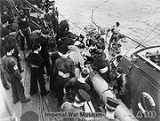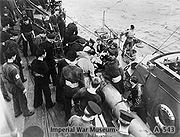
Texel Disaster
Encyclopedia
The Texel disaster took place off the Dutch
coast on the night of 31 August 1940 and involved the sinking of two Royal Navy
destroyers and damage to a third and a light cruiser
. The disaster was caused by a destroyer flotilla
running into an unmarked minefield
which caused serious damage to one vessel; two more destroyers were sunk going to the aid of the first, and a light cruiser sent as an escort was slightly damaged by a mine on the return journey. In all, the disaster caused around 300 deaths, with a further 100 men injured or taken prisoner of war
.
20th Destroyer Flotilla — consisting of , , , and — sailed from Immingham
to the Dutch coast northwest of Texel
to lay mines
. The flotilla was joined by part of the 5th Destroyer Flotilla consisting of , and . While the ships were laying mines, air reconnaissance detected a German naval force moving west from Terschelling
towards Britain; fearing an invasion the 20th flotilla was ordered to intercept.
 Whilst heading for this German force the flotilla ran into a newly laid, uncharted minefield and Express was badly damaged, losing most of her bow
Whilst heading for this German force the flotilla ran into a newly laid, uncharted minefield and Express was badly damaged, losing most of her bow
. The explosion caused heavy casualties: ninety of the 175 men on board were killed or wounded, including her captain, J.G. Bickford, who was injured by the explosion. The flotilla commander, Lieutenant-Commander Crouch, moved his ship, Esk, to assist Express but Esk also hit a mine and the vessel swiftly sank, killing all on board, save one man. Ivanhoe then went to transfer the wounded from Express but also hit a mine and was badly damaged, the explosion killing a further 53 men and wounding the majority of the crew. Several life rafts, carrying shipwrecked sailors, drifted into the Dutch coast where those on board were detained by the German authorities as prisoners of war.
1 September brought Kelvin and Jupiter from the 5th flotilla to help rescue the shipwrecked crews and later two light cruisers — and — arrived as an escort. Ivanhoe was scuttled by fire from Kelvin and the ships returned to port. Jupiter towed
the hulk of Express until tugs could be sent out to take over. On the way, Galatea hit a further mine and was slightly damaged.
. The casualties returning from the disaster, some badly burned, contributed to the myth that a German invasion had been repulsed by the use of burning oil floated on the sea. One theory amongst British civilians and press of the time laid the blame for the disaster with Lord Louis Mountbatten
.
Netherlands
The Netherlands is a constituent country of the Kingdom of the Netherlands, located mainly in North-West Europe and with several islands in the Caribbean. Mainland Netherlands borders the North Sea to the north and west, Belgium to the south, and Germany to the east, and shares maritime borders...
coast on the night of 31 August 1940 and involved the sinking of two Royal Navy
Royal Navy
The Royal Navy is the naval warfare service branch of the British Armed Forces. Founded in the 16th century, it is the oldest service branch and is known as the Senior Service...
destroyers and damage to a third and a light cruiser
Light cruiser
A light cruiser is a type of small- or medium-sized warship. The term is a shortening of the phrase "light armored cruiser", describing a small ship that carried armor in the same way as an armored cruiser: a protective belt and deck...
. The disaster was caused by a destroyer flotilla
Flotilla
A flotilla , or naval flotilla, is a formation of small warships that may be part of a larger fleet. A flotilla is usually composed of a homogeneous group of the same class of warship, such as frigates, destroyers, torpedo boats, submarines, gunboats, or minesweepers...
running into an unmarked minefield
Naval mine
A naval mine is a self-contained explosive device placed in water to destroy surface ships or submarines. Unlike depth charges, mines are deposited and left to wait until they are triggered by the approach of, or contact with, an enemy vessel...
which caused serious damage to one vessel; two more destroyers were sunk going to the aid of the first, and a light cruiser sent as an escort was slightly damaged by a mine on the return journey. In all, the disaster caused around 300 deaths, with a further 100 men injured or taken prisoner of war
Prisoner of war
A prisoner of war or enemy prisoner of war is a person, whether civilian or combatant, who is held in custody by an enemy power during or immediately after an armed conflict...
.
The disaster
On the night of 31 August 1940, the BritishUnited Kingdom
The United Kingdom of Great Britain and Northern IrelandIn the United Kingdom and Dependencies, other languages have been officially recognised as legitimate autochthonous languages under the European Charter for Regional or Minority Languages...
20th Destroyer Flotilla — consisting of , , , and — sailed from Immingham
Immingham
Immingham is a town in North East Lincolnshire, located on the south bank of the Humber Estuary...
to the Dutch coast northwest of Texel
Texel
Texel is a municipality and an island in the Netherlands, in the province of North Holland. It is the biggest and most populated of the Frisian Islands in the Wadden Sea, and also the westernmost of this archipelago, which extends to Denmark...
to lay mines
Naval mine
A naval mine is a self-contained explosive device placed in water to destroy surface ships or submarines. Unlike depth charges, mines are deposited and left to wait until they are triggered by the approach of, or contact with, an enemy vessel...
. The flotilla was joined by part of the 5th Destroyer Flotilla consisting of , and . While the ships were laying mines, air reconnaissance detected a German naval force moving west from Terschelling
Terschelling
Terschelling is a municipality and an island in the northern Netherlands, one of the West Frisian Islands.Waddenislanders are known for their resourcefulness in using anything and everything that washes ashore. With few trees to use for timber, most of the farms and barns are built with masts...
towards Britain; fearing an invasion the 20th flotilla was ordered to intercept.

Bow (ship)
The bow is a nautical term that refers to the forward part of the hull of a ship or boat, the point that is most forward when the vessel is underway. Both of the adjectives fore and forward mean towards the bow...
. The explosion caused heavy casualties: ninety of the 175 men on board were killed or wounded, including her captain, J.G. Bickford, who was injured by the explosion. The flotilla commander, Lieutenant-Commander Crouch, moved his ship, Esk, to assist Express but Esk also hit a mine and the vessel swiftly sank, killing all on board, save one man. Ivanhoe then went to transfer the wounded from Express but also hit a mine and was badly damaged, the explosion killing a further 53 men and wounding the majority of the crew. Several life rafts, carrying shipwrecked sailors, drifted into the Dutch coast where those on board were detained by the German authorities as prisoners of war.
1 September brought Kelvin and Jupiter from the 5th flotilla to help rescue the shipwrecked crews and later two light cruisers — and — arrived as an escort. Ivanhoe was scuttled by fire from Kelvin and the ships returned to port. Jupiter towed
Towing
Towing is the process of pulling or drawing behind a chain, line, bar or some other form of couplings. Towing is most visibly performed by road vehicles, but anything from waterborne vessels to tractors to people can tow cargo. Troop carrying and cargo carrying gliders were towed behind powered...
the hulk of Express until tugs could be sent out to take over. On the way, Galatea hit a further mine and was slightly damaged.
Aftermath
The final toll of the disaster was approximately 300 killed, with a further 100 injured or taken prisoner; this was the greatest loss of life suffered by Nore Command since the evacuation of Dunkirk. The German "invasion force" turned out to be a small minelaying unit transferring from Cuxhaven to RotterdamRotterdam
Rotterdam is the second-largest city in the Netherlands and one of the largest ports in the world. Starting as a dam on the Rotte river, Rotterdam has grown into a major international commercial centre...
. The casualties returning from the disaster, some badly burned, contributed to the myth that a German invasion had been repulsed by the use of burning oil floated on the sea. One theory amongst British civilians and press of the time laid the blame for the disaster with Lord Louis Mountbatten
Louis Mountbatten, 1st Earl Mountbatten of Burma
Admiral of the Fleet Louis Francis Albert Victor Nicholas George Mountbatten, 1st Earl Mountbatten of Burma, KG, GCB, OM, GCSI, GCIE, GCVO, DSO, PC, FRS , was a British statesman and naval officer, and an uncle of Prince Philip, Duke of Edinburgh...
.

